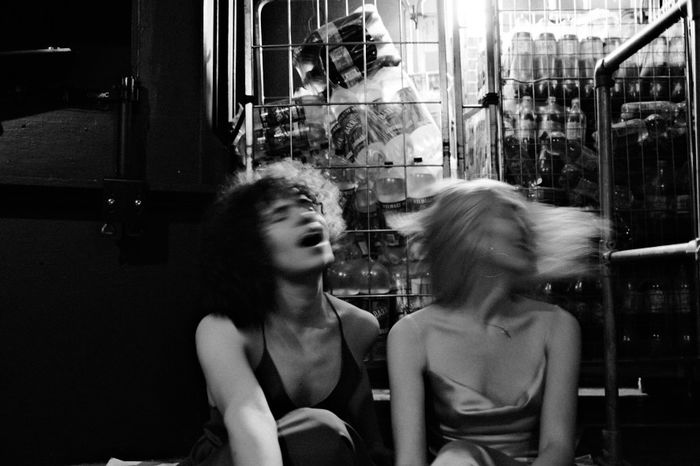#WomenSupportingWomen is a meaning-rich tapestry
Gesturing beyond platitudes of social media activism, this fantastic production insists on interrogating reality

Sat in front of her MacBook, Karina (Lara Ibrahim) monologues to an audience of 109 ‘bitches’ (recent female law graduates). She oozes platitudes. Sisterhood. Solidarity. Us girls gotta stick together. In true #RoséAllDay spirit, I was passed a little paper wine bottle on my way in — Karina brandishes a similar one, pouring herself a glass between general Zoom call and breakout room, the first of many moments where her glossy millennial woman-in-law sheen cracks.
Unbeknownst to her, in the audience of her online seminar geared towards career-focused women, sits recent law grad Sara (Allessia Mavakala). Sara sits squat on the floor, talking into her phone. Director Isabella Ren’s use of levels makes her a diminutive figure compared to the imposing Karina across the stage. In a breakout room, where mentors meet the young women looking to make waves, Karina meets Sara by chance. This is not their first encounter. Sara is thrust into power as she confronts the woman who wronged her years ago. Her life has been put on hold — her sexual assault and subsequent lawsuit have delayed her graduation and put her off practicing law entirely. What’s worse, Karina is implicated in the crime.
“Mavakala is inescapably genuine, delivering her lines with delicate, subtle fury”
Karina is delightfully frustrating as Sara tries to impress on her the extent of her suffering. Ibrahim delivers platitudes with rote, superficial optimism, as if Karina herself isn’t sold on them, telling Sara ‘this is a safe space’, ‘don’t go the pace of the pack’, ’congrats, girl.’ She is almost Patrick Bateman-esque in her inability to empathise with Sara. Mavakala’s performance, on the other hand, is inescapably genuine, delivering her lines with delicate, subtle fury — like a woman scorned. The denial of Sara’s humanity is a recurring theme: she is reduced to stereotypes about Nigerian people by a racist colleague, and there can be no more damning denial of personhood than the assault she endures.
Ina Bi’s set design complements the show’s Zoom-based conceit, drawing stark distinctions between the public and private sphere. Fixed on either side of the stage, Sara and Karina are entirely divided, never stepping beyond the invisible barrier between them. The class and racial division between them becomes a physical one as well. Outside the picture frame of her webcam, Sara’s room is messy, strewn with books — self-help, novels, Frankenstein — unlike Karina’s tidily arranged desk of knick-knacks. Offstage, Karina berates groundskeepers and delivery men. Despite her bids towards solidarity with Sara, her former intern reminds her that she is now ‘a woman of privilege’, unwilling to put her own comfort in jeopardy to further her feminist cause.
“Ibrahim’s performance slips gradually into a brutal naturalism”
Ibrahim’s performance slips gradually into a brutal naturalism as Karina’s boss bitch facade fades. As her conversation with Sara grows tense the hashtags disappear, her language taking on a genuine tone. Karina begins to shake, wobbling a bunch of tulips like bobbleheads in a vase shaped like a woman’s body on her desk, classic millennial feminist decor. Nearby sits a pencil holder shaped like the head of a statue, like remnants of a beheading, bringing Medusa, the ancient victim, to mind. Will this be Sara and Karina’s fate, too?
#WomenSupportingWomen adapts some elements of Amanda Chong’s original Singapore-set script, in particular making the show’s race relations more recognizable to the British viewer. Sara is Italian-Nigerian, her internship seeing her tokenised and mistreated. Testament to the strength of Ren’s direction, the change doesn’t feel shoehorned in. Rather, it makes #WomenSupportingWomen feel inescapably relevant. Many features of the production are eerily reflective of reality, allowing its social commentary to cut even deeper. Beyond its catchy hashtag focus, #WomenSupportingWomen indicts the #MeToo movement, the Weinstein trials, the legacy of Thatcher, and more.
In the most fraught moments of her confrontation with Sara, Karina complains of a buzzing noise that she blames on contractors outside. In the opulence she has built for herself, Karina is unable to hear Sara, entirely left out of the opportunities Karina enjoyed. At first heard only by her, this buzzing, like a conscience, grows louder and louder as the show storms towards its closing moments, and her closing monologue, mirroring the opening, is drowned in this haunting cacophony.
There is plenty to consider in this meaning-rich tapestry. #WomenSupportingWomen refuses to simplify, looking beyond the hashtag, beyond the platitudes, beyond the divisions between us all to take a magnifying glass to the possibility of compassion and solidarity.
#WomenSupportingWomen is playing at the Pembroke New Cellars from Tuesday 7th to Saturday 11th March, 9:30pm.
 Features / Should I stay or should I go? Cambridge students and alumni reflect on how their memories stay with them15 December 2025
Features / Should I stay or should I go? Cambridge students and alumni reflect on how their memories stay with them15 December 2025 News / Cambridge study finds students learn better with notes than AI13 December 2025
News / Cambridge study finds students learn better with notes than AI13 December 2025 News / Dons warn PM about Vet School closure16 December 2025
News / Dons warn PM about Vet School closure16 December 2025 News / News In Brief: Michaelmas marriages, monogamous mammals, and messaging manipulation15 December 2025
News / News In Brief: Michaelmas marriages, monogamous mammals, and messaging manipulation15 December 2025 Comment / The magic of an eight-week term15 December 2025
Comment / The magic of an eight-week term15 December 2025









